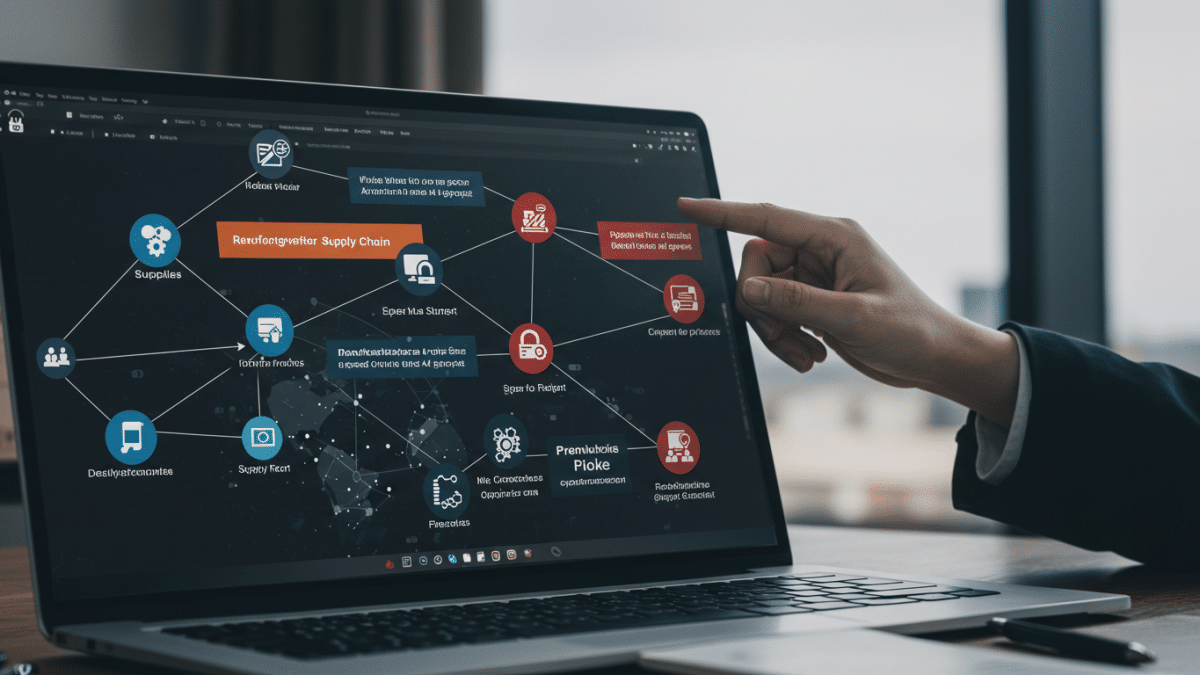
Ransomware on the Assembly Line: Protect Your Manufacturing
April 20, 2025
Data Security in Manufacturing: Guarding Your Edge
April 24, 2025Your Vendors: Your Weakest Link?
In today’s interconnected business landscape, the security of your organization extends far beyond your internal network. Modern manufacturing and service delivery rely on intricate webs of third-party vendors, suppliers, and partners. While these relationships are crucial for efficiency and growth, they also introduce significant cybersecurity risks. Ignoring the security posture of your supply chain can leave your SMB vulnerable to devastating attacks.
Think of it like this: your digital fortress might have strong walls and vigilant guards, but if a trusted delivery person unknowingly carries in a Trojan horse, your defenses are compromised. This “Trojan horse” in the cybersecurity world could be a vendor with lax security practices that becomes a gateway for cybercriminals to access your sensitive data and systems.
The Intertwined World of Modern Manufacturing and Third-Party Risks
The complexity of modern manufacturing amplifies these risks. Consider a small manufacturing business in Houston that relies on multiple suppliers for raw materials, components, software, and logistics. Each of these third parties has its own security vulnerabilities. A breach at any point in this chain could have a ripple effect, disrupting operations, compromising intellectual property, and damaging the reputation of the final product manufacturer.
For instance, if a supplier’s accounting system is compromised, attackers could gain access to sensitive financial information about the manufacturer. Similarly, if a software vendor’s update contains malware, it could infect the manufacturer’s production systems. The interconnectedness means that a security incident affecting a seemingly small player in your supply chain can quickly escalate into a major crisis for your business.
Why SMBs Are Particularly Vulnerable
Small and medium-sized businesses often face unique challenges when it comes to supply chain security:
- Limited Resources:
Implementing robust vendor risk management programs can be resource-intensive, which can be a hurdle for SMBs with tight budgets and smaller IT teams.
- Lack of Awareness:
Some SMBs may not fully grasp the extent of the risks posed by their supply chain or understand how to effectively mitigate them.
- Over-Reliance on Trust:
There can be a tendency to trust established vendors without thoroughly vetting their security practices.
Fortifying Your Defenses: Key Steps for SMBs
Protecting your business from supply chain threats requires a proactive and multi-layered approach. Here are some crucial steps your Houston SMB should take:
- Identify and Categorize Your Vendors:
Create a comprehensive inventory of all third-party vendors you work with. Categorize them based on the level of access they have to your sensitive data and systems, as well as the criticality of their services.
- Due Diligence and Risk Assessment:
Before onboarding any new vendor, conduct thorough due diligence. This includes evaluating their security policies, certifications (like SOC 2), and past security incidents. Regularly assess the risks associated with each existing vendor. Questionnaires, security audits, and penetration testing (where applicable) can be valuable tools.
- Contractual Safeguards:
Ensure your contracts with vendors include clear security requirements, data protection clauses, incident response protocols, and audit rights. Establish liability in case of a security breach originating from the vendor.
- Implement Security Controls:
Depending on the vendor’s access and criticality, implement appropriate security controls. This might include limiting access privileges, requiring multi-factor authentication, and encrypting data shared with the vendor.
- Continuous Monitoring:
Don’t treat vendor risk assessment as a one-time event. Continuously monitor your vendors’ security posture through regular check-ins, security news updates, and performance reviews.
- Incident Response Planning:
Develop an incident response plan that specifically addresses potential security breaches originating from your supply chain. Know how you will isolate the threat, communicate with affected parties, and restore your operations.
- Employee Training:
Educate your employees about the risks associated with third-party vendors and the importance of following security protocols when interacting with them.
Don’t Let Your Vendors Be Your Downfall
In today’s complex digital ecosystem, supply chain security is no longer an optional consideration – it’s a necessity. By understanding the interconnectedness of modern business and proactively managing third-party risks, your Houston SMB can significantly strengthen its overall cybersecurity posture.
Ready to fortify your supply chain and ensure your vendors aren’t your weakest link? Contact Krypto IT today for a free, no-obligation consultation. Our Houston-based cybersecurity experts can help you assess your risks and implement a robust supply chain security strategy tailored to your specific needs.
#KryptoIT #SupplyChainSecurity #Cybersecurity #SMBsecurity #HoustonTech #VendorRiskManagement #ThirdPartyRisk




